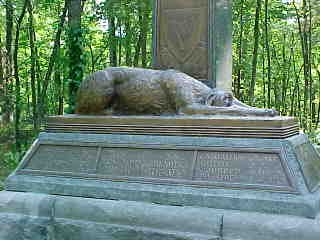Andrew Greely, the Jesuit sociologist and author, once remarked to me about Princeton's James McPherson: "Why is such an otherwise fine historian so anti-Catholic." The following raise that question.
"Immigrants were
proportionally under-represented in the Union’s armed services...Despite the
fighting reputation of the Irish Brigade, the Irish were the most
under-represented group in proportion to population, followed by
German Catholics."
- James M.
McPherson,
Battle Cry of Freedom, p 606, 1988
"The
under-representation of Catholic immigrants can be explained in part by
Democratic allegiance of these groups and their opposition to Republican war
aims, especially emancipation...Although this group furnished a large number of
substitutes and bounty men during the final year of the war — thereby achieving
an inglorious visibility — they also furnished a large number of deserters and
bounty jumpers."
- James M.
McPherson,
Battle Cry of Freedom, p. 607, 1988
The problem with Professor McPherson's remarks start with the Union army never recording the religion of its soldiers. Who could possibly know how many were, in fact, Catholic.
The second problem is that there are no census records available telling us exactly how many Catholics, or even Irish, were available for military service during America's Civil War.
The last and most egregious problem is that historians including McPherson confuse the Sanitary Commission Report estimate for the number of Irish born soldiers serving in state volunteer units with the number of Irish serving with Union forces. The Sanitary Commission Report estimate did not include soldiers in regular army units, nor most from the territories, nor militia units and excluded all the marines and sailors. Moreover, as acknowledged in the Sanitary Commission report the Union army did not record place of birth for 43 percent of the soldiers. Not surprisingly, the highest levels of failure to record were in states with the highest concentration of immigrants: Massachusetts, New York, and Pennsylvania.
(
http://hidden-civil-war.blogspot.com/2013/11/the-unions-irish-soldiers-and-sailors.html)
At the University of Virginia, for example, misrepresenting a source is considered academic fraud:
False Citation: False citation is falsely citing a source or attributing work
to a source from which the referenced material was not obtained.
A simple example of this would be footnoting a paragraph and citing a work
that was never utilized.
Estimates adjusting for Sanitary Commission omissions and separately on Medal of Honor data put the number of Irish born serving with the Union army and navy at over 200,000, at least 50 higher than the uncorrected Sanitary Commission estimate.
Why did Professor McPherson make such an egregious mistake? Inherited prejudice.
"I share [with my cousin] a great-great-grandfather who fought in the Civil War. This man, Jesse Beecher, emigrated from England in 1857 and became a prosperous wheelwright in an upstate New York village....Another clue [to why he served] is provided by the name he bestowed on his first child born in the United States: Henry Ward Beecher, after the famous antislavery clergyman."
- James M. McPherson,
For Cause and Comrades, p 4, 1997
While fans of the Beechers like to remember Harriet and Henry Ward as abolitionists, they avoid mentioning that others in the family were among America's most prominent and rabid anti-Catholics. Their father Lyman was the author of the widely read anti-Catholic diatribe
A Plea for the West, whose fiery sermons instigated the Ursuline Convent Riots in 1834. In 1855, Beecher's son Edward authored
The Papal Conspiracy Exposed, of which Orestes Brownson observed: "Dr. Beecher is haunted by strange visions of a papal conspiracy against American Protestantism and American liberty, and in his agitated dreams he calls out upon his countrymen to put an extinguisher upon Catholicity."
http://hidden-civil-war.blogspot.com/2013/08/the-generals-and-small-catholic-church.html
http://hidden-civil-war.blogspot.com/2013/08/the-norths-greatest-hispanic-general.html
http://hidden-civil-war.blogspot.com/2013/08/nessun-dorma-fighting-irish-assault.html
Never mind that Princeton University's other name is "Old Nassau", a celebration of William of Orange-Nassau, the Dutch conqueror of England and victor at Ireland's Battle of the Boyne, which sealed the tragic fate of Ireland's Gaelic-speaking Catholic peasantry, writing in stone the proto-Apartheid Penal Laws which oppressed the Irish even into the 20th century.
---------------------------
That the history profession accepted McPherson's egregious canards without objection can be summed up in The New York Times choice of reviewer for the book: Hugh Brogan, a British historian, whose only objection was to the grey background of the book's maps.
http://www.nytimes.com/books/98/12/06/specials/mcpherson-freedom.html
---------------------------
Make a racist or anti-Semitic remark and you'll lose your job or your business. Defame the Irish and the Catholics and they award you the Pulitzer Prize.
 The Times interesting story about Okinawa and its version of "Danny Boy" by Isamu Shimoji and Yukito Ara missed the unique connection between that Emerald Isle and New York's Irish. New York's fabled "Fighting Irish" 69th regiment won its last Medal of Honor for valor above and beyond the call of duty on April 28, 1945 when Pfc Alejandro Ruiz single-handed stormed and captured a heavily defended Japanese position. A representative of the 69th read Joyce Kilmer's "The Rouge Bouquet" at Ruiz's funeral in 2010 while a piper played the regimental song "Gary Owen."
The Times interesting story about Okinawa and its version of "Danny Boy" by Isamu Shimoji and Yukito Ara missed the unique connection between that Emerald Isle and New York's Irish. New York's fabled "Fighting Irish" 69th regiment won its last Medal of Honor for valor above and beyond the call of duty on April 28, 1945 when Pfc Alejandro Ruiz single-handed stormed and captured a heavily defended Japanese position. A representative of the 69th read Joyce Kilmer's "The Rouge Bouquet" at Ruiz's funeral in 2010 while a piper played the regimental song "Gary Owen."
